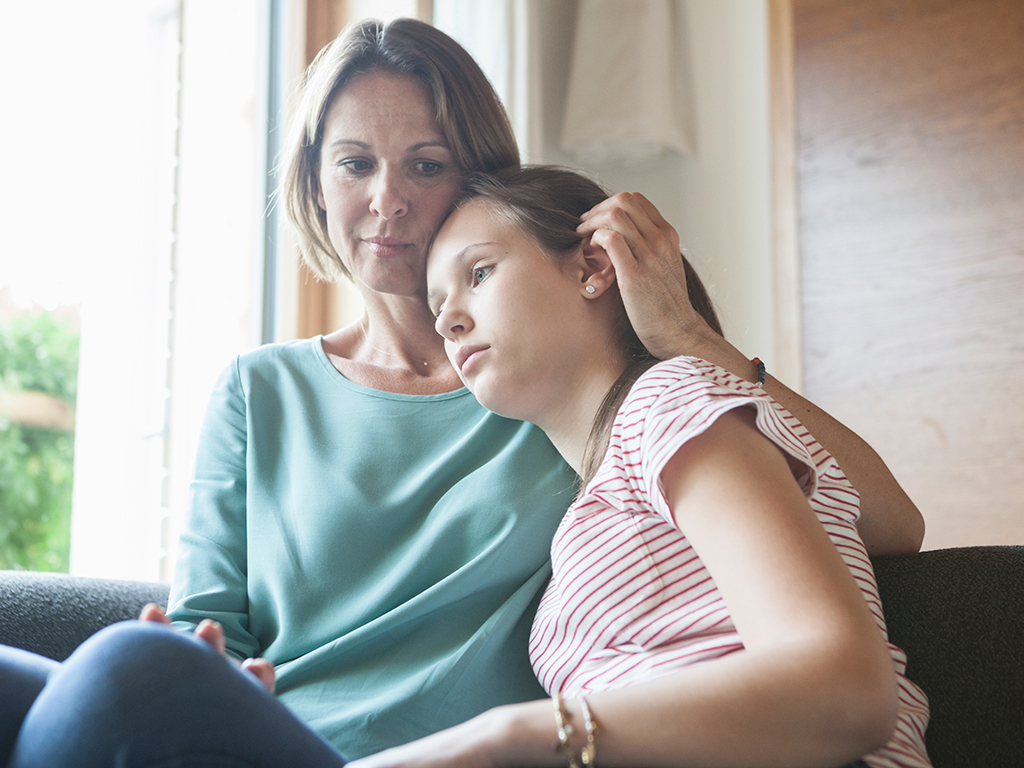Losing a loved one at any age is difficult, but explaining death to children can be particularly hard — especially if you are dealing with the loss yourself.

“A lot of adults feel unequipped or ill-prepared to support children,” Fardous Hosseiny, the national director of research and public policy at the Canadian Mental Health Association, told Global News.
“This is especially true when the person who is dying or has died is close to the child or family.”
WATCH BELOW: Ask the Doctor: The stages of grief and coping with the pain

So how do you talk to a child about losing a parent, a grandparent or even a friend? It is important to start with honesty, Hosseiny says.
Be open and honest
“Usually a parent’s first instinct is to protect the child or youth from the grief by withholding information,” Hosseiny said. “We think if we hide this information from them or don’t tell them anything that we’re actually protecting them, but it’s quite the opposite.”
Hosseiny said that by telling children the truth and not shielding them from the reality of loss, it helps them understand and process their difficult emotions. Honesty allows them to understand what is going on around them, and try to make sense of it.
- What is a halal mortgage? How interest-free home financing works in Canada
- Capital gains changes are ‘really fair,’ Freeland says, as doctors cry foul
- Ontario doctors offer solutions to help address shortage of family physicians
- ‘Dangerous message’: Experts slam anti-sunscreen claims circulating online
READ MORE: With social media, you don’t have to grieve alone
“The truth gives an explanation for your own tears and pain, so being open and emotional can help your child mourn,” Hosseiny said. “If you hide information, it can cause kids to feel mistrust, and then they’ll be reluctant to turn to you for support in the future.”
Use simple language
Adults may feel inclined to use words and phrases to describe death that are less direct, like “passed away” or “crossed over.” While these phrases are well-meaning, Hosseiny said these terms are not helpful for children.
“Research shows that using realistic words to describe death helps the grieving process,” he said. “Make sure not to use any euphemisms, because that can lead to a lot of confusion, like, ‘She’s in a better place,’ kids might think she went somewhere great, or, ‘She left us,’ kids could think someone left them to get away.”
Listen and express your own emotion
Many adults want to put on a brave face for children who are experiencing loss, but it is important for them to show that they’re experiencing emotion, too. Hosseiny said adults should be prepared to talk about their own thoughts and feelings when they ask kids about how they’re holding up.
READ MORE: Grief can be a ‘lifelong’ journey when death is unexpected — tips on how to cope
“Understand that the way your child is processing may be different than the way you’re processing, so let them express their feelings,” he said. “Let them walk you through it, and then express your own emotions. If you need to cry, cry together. It’s healthy to be healing.”
Donna Kutzner, a certified educational therapist based in Edmonton who recently wrote a book on grief for children called, A New Leash on Life: A Remedy for Healing After Loss, said parents often feel overwhelmed by their own emotions, and as a result, become unsure of how to help others.
“A lot of the time the adult hasn’t even gone through their own grief, so they don’t know how to do it with their own child,” Kutzner told Global News. “For children, the grief that they go through and the loss, it’s so ignored … mostly the children are forgotten.”
“Validating the child’s feelings is huge.”
READ MORE: Living inheritances are booming in Canada, here’s why
Hosseiny echoed this and said acknowledging a child’s emotions is vital. He said that expressing emotion helps prevent negative feelings from bottling up, and if children do not process grief, they can carry it into their adulthood. Unresolved childhood trauma can lead to mental health issues including anxiety and forms of depression, Hosseiny said.
Allow children to participate in rituals
Hosseiny said it is important for kids to feel included in the grief process by allowing them to pay tribute to lost loved ones. This can be done by letting a kid help pick out photos for a memorial service, or choose a song that is played at a funeral.
Watch for behaviour
Depending on a child’s age, they may not have the vocabulary to express their emotion, and will, therefore, act out how they are feeling. Kutzner said if kids are having a hard time talking about their feelings, asking them to draw out emotions might help.
If a kid is reluctant to talk, Hosseiny said parents should pay attention to changes in their behaviour. Common emotional reactions include fighting, denial, mood swings, self-blame, fear of being alone, and regression to early childhood behaviours, he said.
READ MORE: 5 physical signs your diet needs to change
Hosseiny also said to watch for physical complaints, like stomachaches or headaches, which kids commonly cite when they are experiencing emotional upset. These behaviours can be part of the normal grieving process, but pay attention if they do not subside or get worse.
“It’s common for emotions to be expressed and repeated over time,” he said.
“You’ll see it in little spurts here and there, but if a child completely shuts down, then that’s when it would be wise to get professional help.”
Laura.Hensley@globalnews.ca






Comments